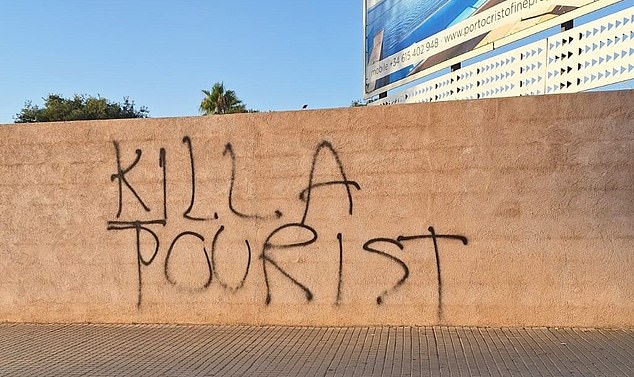Hundreds of bars and restaurants in Mallorca are facing imminent closure after the worst season since Covid and tourists are tightening their belts.
The warning is being issued by the catering industry’s employers’ association, PIMEM-Restauración, which claims that its members are being strangled by three essential factors: the lack of qualified personnel, the increase in personnel and activity costs and the fall in sales.
Its president, César Amable, says that the increase in travel prices – especially airline tickets – and accommodation has hit his sector and other pillars of the complementary offer such as commerce this summer.
‘The average stay has been shortened and tourists’ budgets have been limited, thus penalising extraordinary travel expenses, a situation that has ended up confirming the least profitable season in recent years, pandemic period aside,’ he said.
The picturesque Spanish island has also been rocked this year by a wave of anti-tourism protests calling for “low-quality” visitors to leave in response to a lack of local housing, limited job opportunities and a rising cost of living.
During the summer, some sinister graffiti appeared on a wall in Mallorca
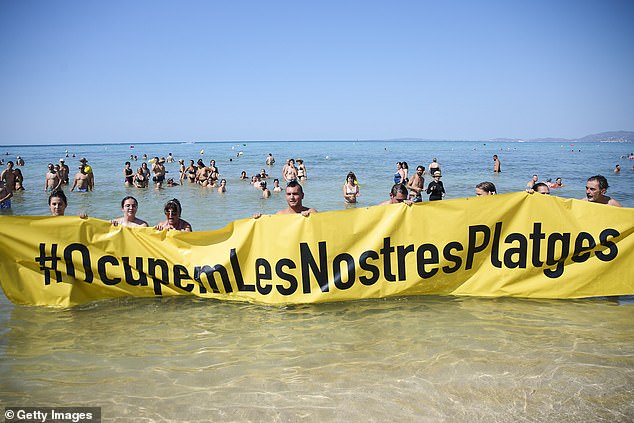
Members of the Mallorca Platja Tour association demonstrate against tourism with a banner reading ‘Let’s occupy our beaches!’ on the beach in Palma de Mallorca on August 11
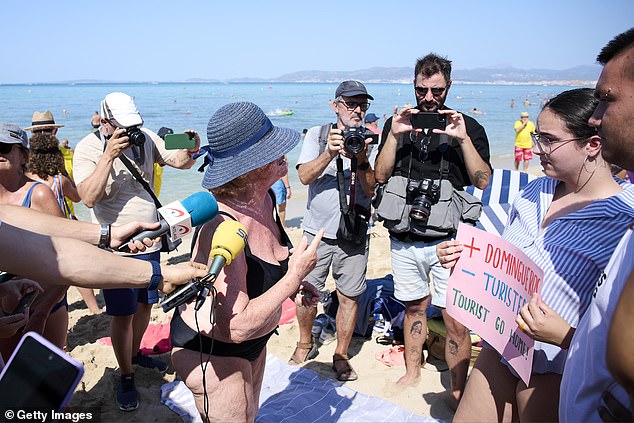
A protester speaks during a demonstration on the beach in Palma de Mallorca in August.
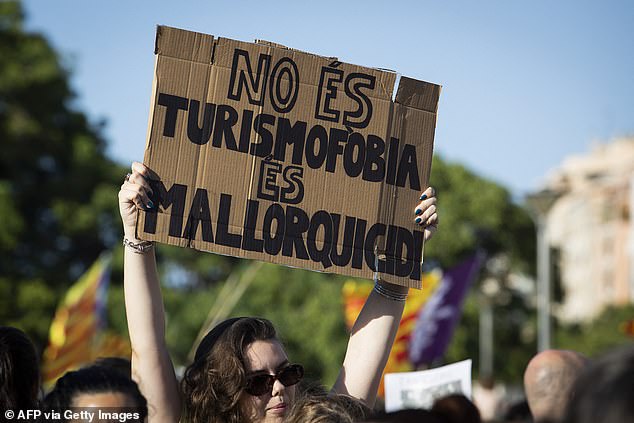
A protester holds a sign reading “It’s not tourismophobia, it’s mallorquidism” during the protest
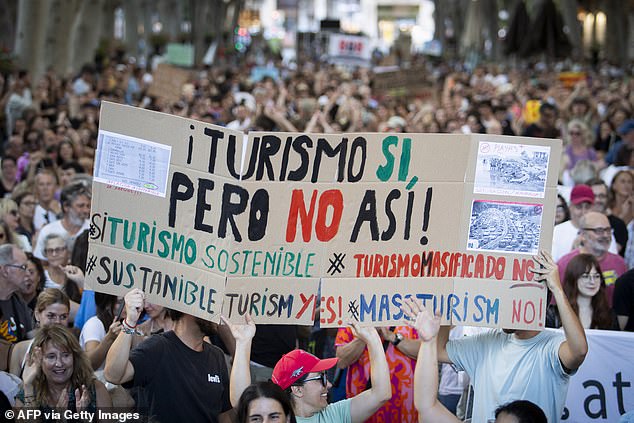
Protesters hold a sign reading ‘tourism yes, but not like this’ during a march in Palma
Restaurateurs are calling for the creation of a hospitality agreement of their own that differentiates their conditions from those of hoteliers, as is already the case in other regions of Spain such as La Rioja, Madrid or Guipúzcoa at the provincial level.
The wage increases, they say, are unaffordable for a sector that has seen its turnover fall by around 20 percent this season compared to last season.
The collective agreement has increased staff costs by 25.3 percent since 2018, while the price of meals has risen by 10 percent in the same period.
“There is a huge gap between hotels and restaurants. I think it’s great that hotels can raise prices as much as they want, but there are many things that differentiate us,” Amable said.
He warned that the drop in revenue this season will probably lead to the early closure of many businesses located in tourist areas of Mallorca and the rest of the archipelago.
If a new agreement is not reached, he warned: “We restaurateurs have a very bad future.”
Mr Matas said they had been pushing for their own deal for the past 15 years but nothing had happened.
“Since then the situation has worsened a lot and restaurants are overwhelmed,” he added.
During the six months to the end of June, 42.5 million international visitors travelled to Spain, with June alone seeing a 12 per cent rise to 9 million as the busiest period of summer begins, according to Spanish data agency INE.
This means that 2024 is shaping up to be another record year for tourism, with France already the second most visited country in the world behind France.
It is expected to surpass last year’s peak of 85 million tourists, when numbers exceeded pre-pandemic levels.
Data shows that visitors are increasingly choosing to stay in rental apartments rather than hotels, boosting demand for apartments and incentivizing landlords to buy homes at the expense of residents.
The number of visitors to Spain in the first half of the year staying in this type of accommodation increased by 30 percent, while the number of those staying in hotels increased by 11 percent.
Amid widespread discontent over wages, housing and opportunities, residents of Mallorca took to the streets in large demonstrations against perceived “overtourism”.
In July, Barcelona residents responded in their own way, firing water pistols at tourists enjoying dinner on a street popular with foreign visitors.
Under the slogan ‘Enough! Let’s put limits on tourism’, some 2,800 people – according to the police – marched through a neighbourhood on Barcelona’s seafront to demand a new economic model that would reduce the millions of tourists who arrive each year.
Rising house prices in Barcelona, which have increased by 68 percent in the past decade, are one of the main problems of the movement, along with the effects of tourism on local commerce and working conditions in the city of 1.6 million inhabitants.
Rents rose 18 percent in June from a year earlier in tourist cities such as Barcelona and Madrid, according to property website Idealista.
For years, the city has been plastered with anti-tourism graffiti, with messages like “tourists, go home,” aimed at visitors, who some blame for rising prices and shaping the economy around tourists.
Local authorities in Barcelona have since responded by saying they would introduce a tourist tax for short-stay cruise passengers in an attempt to ease tensions.
But local businesses that rely on tourism fear such hasty measures could deter the people they rely on for a living.
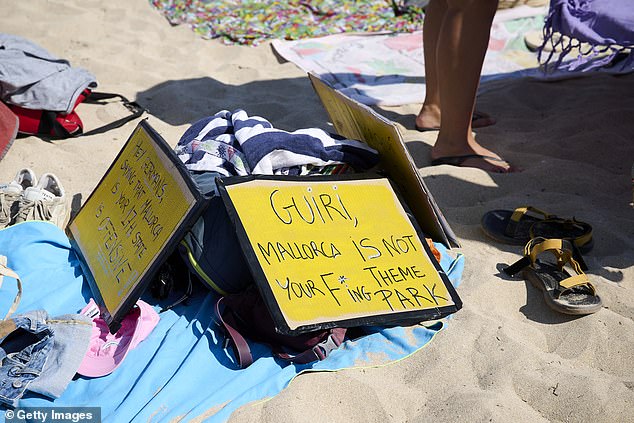
The activist group said they chose the area because it is known for drunkenness and disorder.
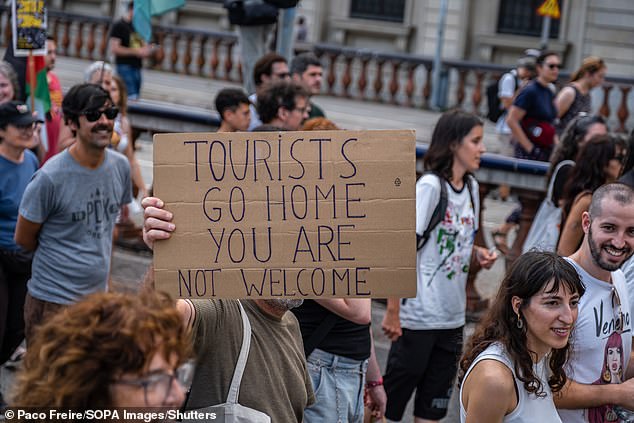
An anti-tourism poster is seen during a demonstration in Barcelona in July.
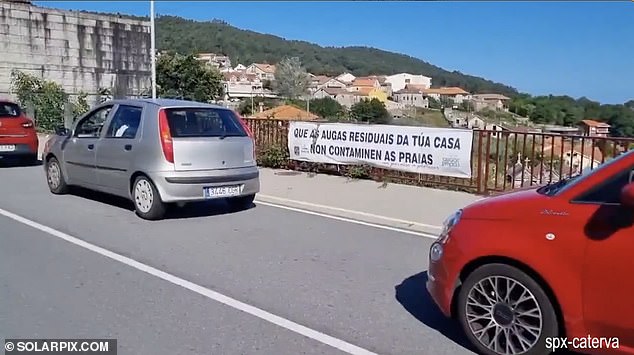
Anti-tourism protests erupted over the summer, with locals seen marching to “take back the beaches” and hanging signs reading “Tourists, go home” at popular tourist spots across the country.
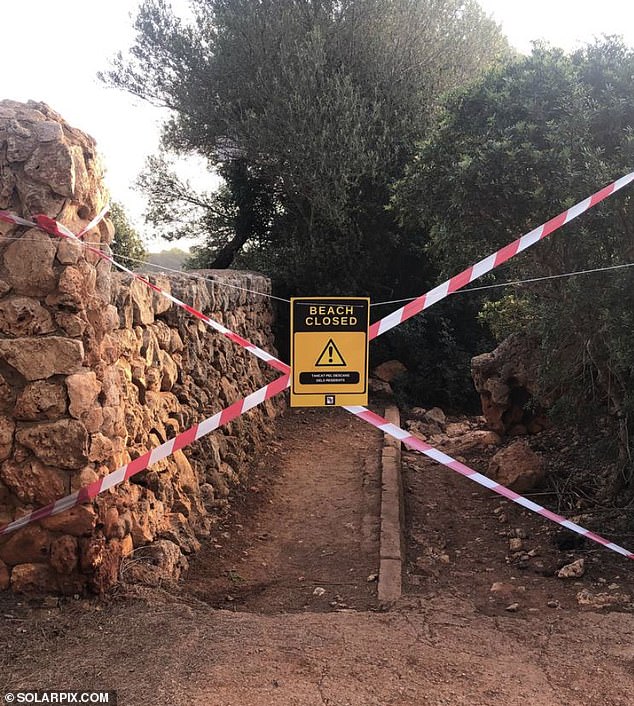
The protest group Caterva placed red ribbons and ‘Beach closed’ signs in several coves in Manacor, east of Mallorca, at the end of August
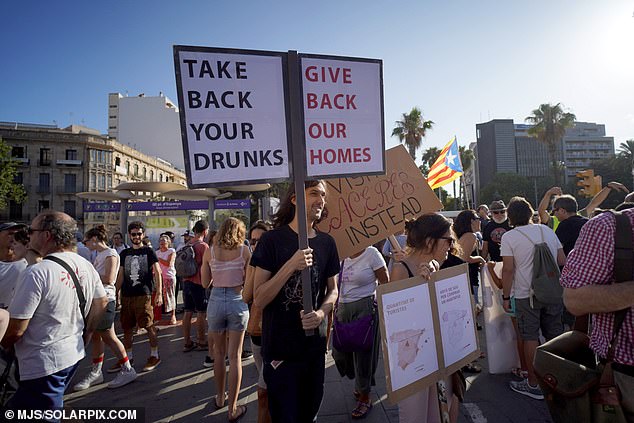
A protester holds a sign reading ‘Give us back our drunks, give us back our houses’ during a demonstration in Palma this month
The first major protest in Alicante, on the peninsula, took place in July, when hundreds of residents took to the streets to express their concern about over-tourism.
Dozens of residents gathered in the central Plaza Toros with signs and flags reading “Get out of our neighborhoods,” “our house is not the gringos’ yard” and “to hell with AirBnB” amid fears that locals are being forced out of their homes and stuck in unstable jobs catering to foreign visitors.
The aggrieved residents chanted “Alicante is not for sale”, blew whistles and waved flags, closing off streets as they gathered on Calderón de la Barca street, ending their march at the tourist office to much applause from the crowd.
And on July 27, some 250 protesters prevented tourists from accessing a picture-perfect Menorcan beach in a ‘surprise action’.
The activists boasted of filling a car park next to Cala Turqueta, a beautiful cove on the island’s south coast, with “residents’ cars”.
Later, using towels and their own bodies, they drew the message ‘SOS Menorca’ in the sand next to the waterline.

